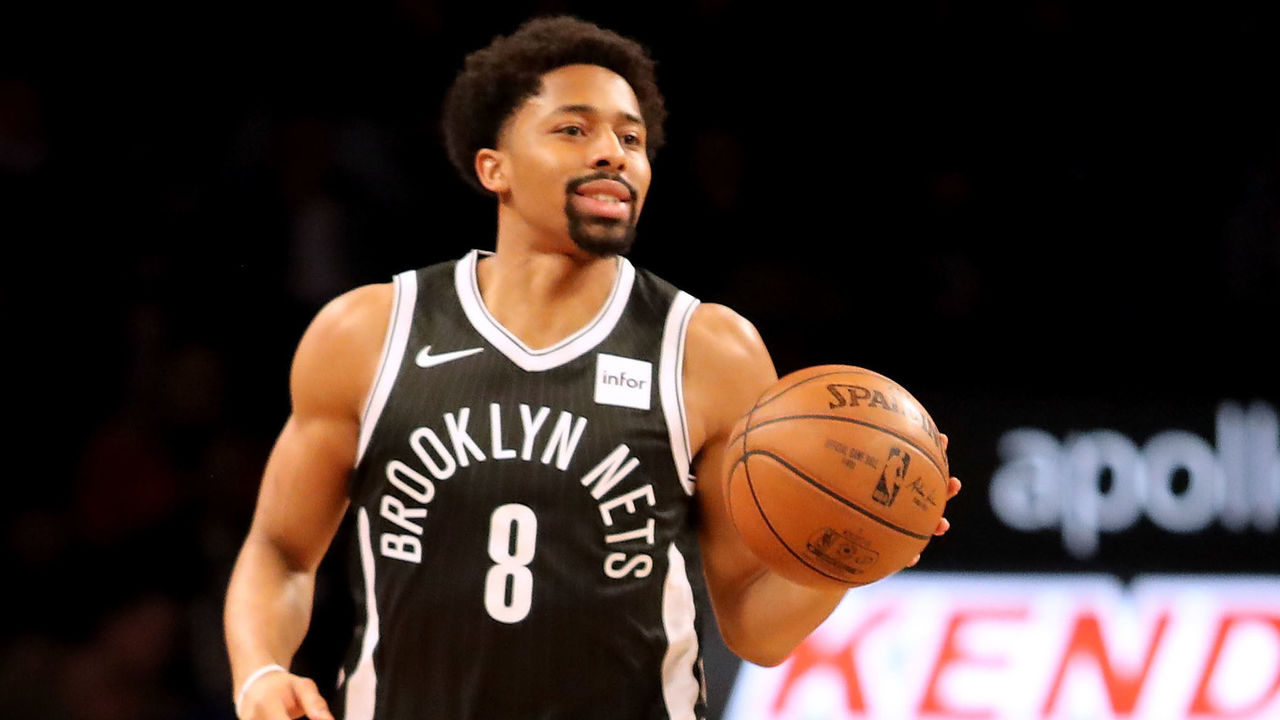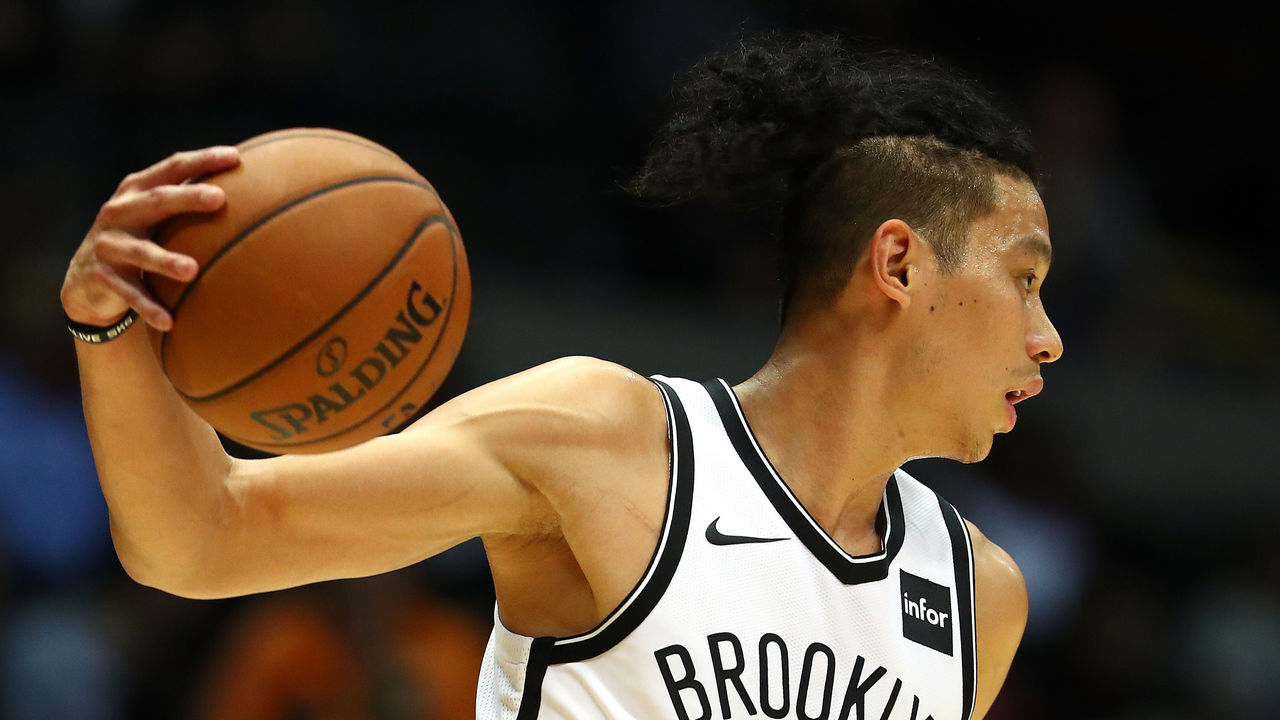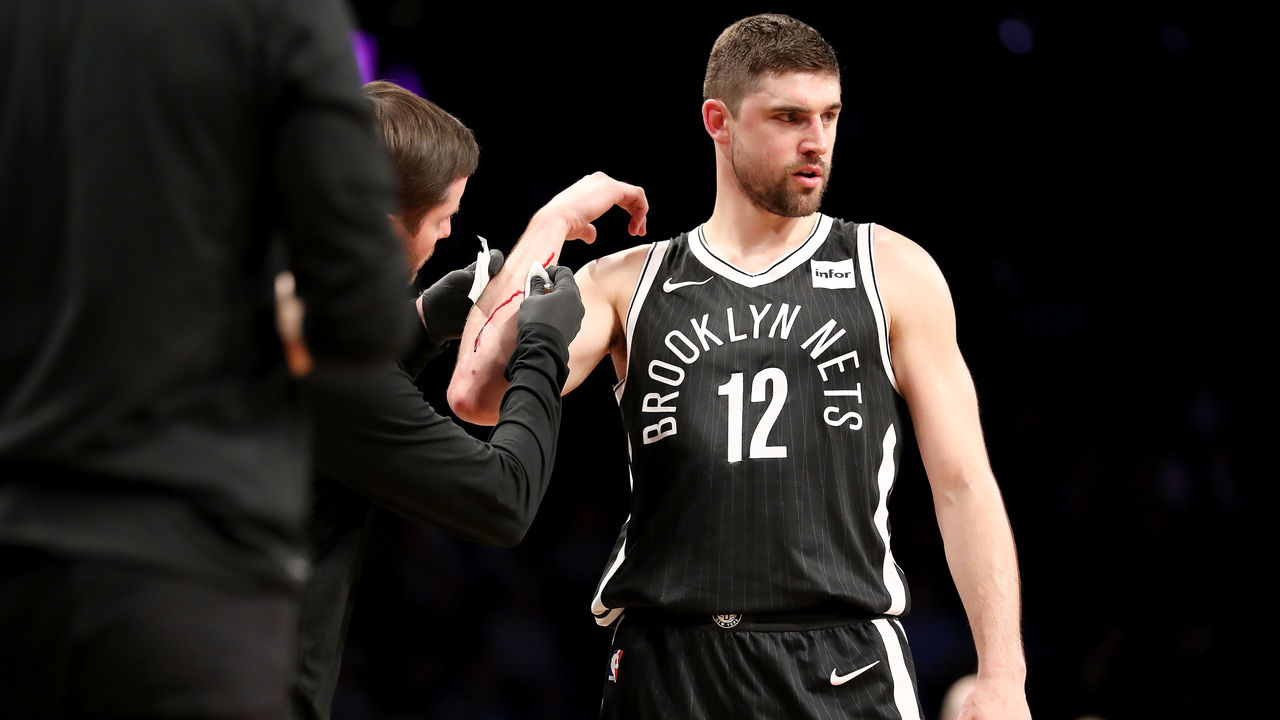Better Luck Next Year: Brooklyn Nets edition
As NBA teams are officially eliminated from title contention, theScore NBA freelance writer Andrew Unterberger takes a look back at the highs and lows of their season, along with the biggest questions ahead of 2018-19. The seventh edition focuses on the Brooklyn Nets.
The Good

Spencer Dinwiddie's breakout. Dinwiddie's season isn't ending with All-Star numbers - he's only shooting 38 percent from the field, and recently got yanked from the starting lineup after a fairly rough late February and early March. Still, Dinwiddie provided leadership and direction when the Nets were adrift at midseason, he has an assist to turnover ratio of over 4-to-1, he hit some huge shots, and he's generally shown the playmaking and floor presence to be an NBA contributor for a long time. Plus, he's dirt cheap at under $2 million a season for this year and next - the exact kind of player you want to pick off the scrap heap when you're not playing particularly competitive basketball, as the Nets weren't and aren't.
Rondae Hollis-Jefferson makes the leap. RHJ had been promising but not terribly productive in his first two seasons as a Net after Brooklyn traded Mason Plumlee for him on draft night in 2015. This year, he finally started posting the numbers to match his skills and athleticism: 14 points and seven rebounds on 47 percent shooting, output that looks even more impressive per 36 minutes (18 and nine).
Hollis-Jefferson still can't hit from three (12-for-49 this season), but he drastically improved his mid-range game. After making just 35 percent of the jumpers he took from 10-16 feet last year and 31 percent from 16 feet out to the arc, he upped those numbers to 49 percent and 47 percent respectively this season, and on greater volume. He still has room to grow - particularly on defense, where he hasn't quite developed into the versatile terror you'd have expected from watching him at Arizona - but he's clearly a keeper.
Jarrett Allen's dunk on Lauri Markkanen. You just knew from looking at him that Markkanen was gonna get brutally posterized sooner than later, right?
The dunk is the highlight from what's been a pretty successful rookie season for the 22nd overall pick out of Texas. Allen's minutes were somewhat sporadic, but he's averaging 15 points and 10 rebounds per 36 on extremely efficient 58 percent shooting - and 78 percent from the line, impressive for a raw big man. He's shuttled into Brooklyn's starting lineup the last two months and essentially served as their Young Man's Tyson Chandler - gobbling up boards, hanging tough in the post, and providing a perpetual lob threat as a roll man. He may not have proven himself as a long-term piece, but he should continue to get the chance to do so next year.
D'Angelo Russell's late-season surge. The Nets' prize acquisition from the Brook Lopez trade of a summer earlier averaged a career-high 21 points a game for the first month of the season before going down with a knee injury. He underwent surgery, missed the next two months, and then struggled to pick up where he left off, but his stronger play leading up to the All-Star break got him back into the starting lineup afterward. Since then, Russell has rediscovered a little of his early-season explosiveness, averaging 17 points and five rebounds on 38 percent shooting from deep, including a 32-point outpouring against the Raptors two weeks ago. It'll take at least another season to see if he has franchise-player potential, but there's reason for hope, and he only just turned 22.
Kenny Atkinson, sub-.500 Coach of the Year. Like Brett Brown for the Sixers in the early days of the Process, Atkinson's drawing the most enthusiastic praise from pundits and peers out of any coach whose team is a long way from contending. It's not hard to see why: Despite lacking obvious elite talent, the Nets have separated themselves from the league's obvious dreck. Their offense and defense are both outside of the bottom five; they're forming a ball-sharing, long-range-gunning offensive identity; and they're developing several non-blue-chip prospects into what appear to be long-term pieces. It may still be a while before that elite talent comes to Brooklyn, so we'll see if Atkinson can keep the team growing until it arrives.
The Bad

The Jeremy Lin injury. Lin and Russell were supposed to be the Nets' backcourt of the future, or at least the present. But there would be no Lin-Russanity in Brooklyn this year, as the former was lost with a right knee injury 18 minutes into the team's season opener. Lin will finish his second year in Brooklyn having played in just 37 games for the Nets, with only one season remaining on his contract to prove he's the veteran who can help take these young 'uns to the next level. And besides: Don't you just miss Jeremy Lin being part of the NBA? You should. He's fun.
Nik Stauskas and Jahlil Okafor. When the Nets traded productive bench veteran Trevor Booker to Philly, they weren't really dealing for either of these former lottery-pick castoffs - they were after the future second-rounder the Sixers inexplicably gave up for Booker (only to waive him three months later). Still, general manager Sean Marks probably hoped at least one of Philly's fallen-angel prospects would pop this year.
Unfortunately, Stauskas is only seeing garbage-time minutes, and Atkinson mostly just dusts off Okafor when they play the Sixers and he actually seems motivated. It'd be surprising if either player was on the Nets next season - and if there's a long-term home for either of them in the NBA, it's hard to predict where that might be.
A one-win February. The Nets kept themselves out of the territory of the truly terrible through January, maintaining a respectably subpar 19-33 record. But as injuries took their toll and the schedule got tougher, the bottom fell out. They only won one of their 10 February games, including an eight-game losing streak - twice as long as any other they've suffered this season - that dropped them down with the Suns and Grizzlies in the tanking rankings. They've perked up a bit in March, with three wins in their last seven games, but outdoing last season's 20-win total will have to be accomplishment enough for this edition of the Nets.
The Allen Crabbe trade. After a disappointing first post-extension season in Portland, the Blazers essentially asked the Nets for backsies on their decision to match Brooklyn's four-year, $75-million offer sheet to Crabbe in 2016. The Nets accepted, taking Crabbe in exchange for Andrew Nicholson - but they may have jumped back in front of a bullet they dodged two summers earlier. Crabbe's numbers were similarly pedestrian in his Brooklyn bow: 13 points and four rebounds on 40 percent shooting (37 percent from three). He's still got use as a 3-and-sorta-D wing, but he'd be better at an eighth man's salary - as opposed to the $37 million for two years that Brooklyn still owes him after this season.
No draft pick at the end of the tunnel. For an ordinary rebuilding team, the Nets' 2017-18 season would be an unqualified success: They developed players, accrued assets, strengthened their culture, and lost a whole bunch. The customary reward would be a top 10 pick. Unfortunately, many years ago, Billy King ensured that it would be a minute before the Nets could become an ordinary rebuilding team, and at the end of the season, they'll hand their first-round pick to the Cavaliers (via the Celtics) as the longest-reaching result of the Kevin Garnett/Paul Pierce trade of 2013.
The good news for Brooklyn? This is it: After June, the only remaining outgoing draft considerations are a couple second-rounders the team owes to the Magic, all other debts settled at long last.
The Questions

What will this year's draft assets amount to? Despite having to forfeit their top pick, the Nets still have some chips at June's draft: a first-rounder the Raptors owe them from the DeMarre Carroll dump (mostly likely to be either pick No. 28 or 29), as well as three second-rounders from the Pacers, Bucks, and the lower of the Magic and the Lakers.
That might not be enough to land much of a difference-maker with any individual pick - though the Lakers did get Kyle Kuzma with a late first-rounder they acquired from Brooklyn the summer before - but it does give them a little room to maneuver. It could be interesting to watch the Nets on draft night as they try to turn a handful of nickels and pennies into a quarter.
What to do about Joe Harris? Another one of the mini-success stories of the Nets' season was the emergence of Virginia wing Harris, who's been one of their most consistent two-way players this season, averaging 10 points and three rebounds on 47 percent shooting (40 percent from three) and providing reliable, if not game-changing, team defense. But Harris' contract is up and he'll be an unrestricted free agent, sure to garner interest from teams with more immediately promising futures. It hurts to let a player like Harris leave for nothing, but overpaying to keep him around might hurt even more. With a cap sheet that's already a little more cluttered than you might think, will Brooklyn spend what it takes to retain its new Joe Cool?
Who starts in the backcourt next year? Assuming everyone is healthy - never a safe assumption about Brooklyn guards, but let's get nuts - the Nets have an unusually crowded backcourt for a retooling squad. Lin, Russell, Dinwiddie, and impressive sophomore Caris LeVert should all be under contract, with enough mix-and-match opportunities to keep Atkinson up late diagramming at night. Will the Nets prioritize veteran presence and productivity or development and long-term upside? And will their offseason dealing make things even more complicated?
Will they extend Russell and Hollis-Jefferson? Probably the two players on the current roster with the most overall value, Russell and RHJ are still young and seem to be just scratching the surface of their considerable potential. But it can be tough to project exactly what that overall value is, and the Nets are running out of time to put a dollar amount on it. They'll have to decide if they want to work out extensions with Russell and Hollis-Jefferson by October, or risk letting them enter restricted free agency the following summer. Can they lock them up to reasonable, team-friendly deals before they start to reach their ceilings and really max out the Nets' cap space?
Are they too good to tank again? The Nets have been terrible for three seasons and don't have a single lottery pick of their own to show for it. Considering their no-swaps-attached 2019 first-rounder, it probably makes sense to stay bad for another season, finally allowing Brooklyn to add a franchise-caliber talent to its rotation of overachieving youngsters and overpaid castoffs. But the Nets might not have the stomach for another season with a win total in the 20s, and at this point, the team might be too good to be that uncompetitive. How can the Nets get a top draft pick for the first time in forever without undoing everything they've accomplished with their roster and culture in the interim?
(Photos courtesy: Getty Images)